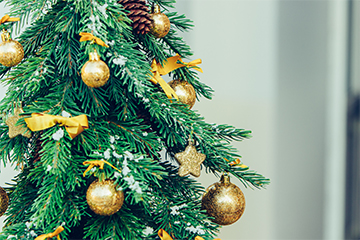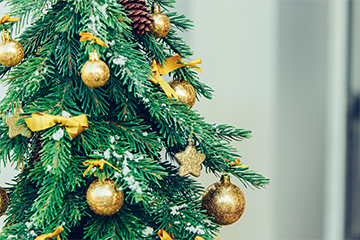

Last year alone, the National Christmas Tree Association reported that nearly 60 million Christmas trees were purchased in the United States, with approximately 23.6 million of those trees being artificial in origin and 32.8 million being real.
And Americans, of course, will have a variety of reasons for swinging one way or another regarding their Christmas tree purchases, be it the smell of the tree itself or a desire to reuse their tree every year in an effort to be environmentally-friendly.
But one thing all of those 60 million Christmas trees had in common was the potential to contribute to indoor air pollution.
Now, as you embark on your own family excursion to hunt for your 2019 Christmas tree, here’s what to keep in mind:
Live Christmas Trees
Did you know live Christmas trees could have adverse effects on your indoor air quality? According to a study completed by the American College of Allergy Asthma and Immunology, the number of mold spores in your home could potentially increase exponentially in only a two-week timeframe after installing a live Christmas tree.
And as if mold weren’t enough to keep in mind with regard to your home’s indoor air quality, reports also show that Christmas trees can carry in additional volumes of dust and fungi, as well as bugs that you’d rather keep from encroaching on your personal space. The trick, in this case, is that you want to be thorough while inspecting potential Christmas trees and then rinse it off outside prior to bringing it into your home.
Artificial Christmas Trees
While artificial Christmas trees are unlikely to carry mold or dust so long as they are well maintained and properly stored, they are not without their own hazardous elements. That is, most artificial Christmas trees today are created using polyvinyl chloride, or PVC, which is the third-most widely produced synthetic petroleum-derived plastic polymer.
And the catch with PVC? Not only is it non-biodegradable but, according to some studies and organizations, PVC also releases toxic gases known as volatile organic compounds (VOCs) that can cause physical irritation, mental disorientation, and the exacerbation of other pre-existing conditions like asthma. However, what may help to reduce your exposure to these gases is to unbox your artificial tree outdoors every year and let it air out a bit prior to setting it back up in your home.
If you have further questions regarding how your Christmas tree may be impacting your indoor air quality, or if you’re ready to reach out to Florida’s expert indoor environmental professionals, then it’s time to contact Luce Air Quality! Not only do we have 11 years’ worth of experience in the restoration and remediation industry, but we believe in providing you with solutions you can trust. Call us today at 904-803-1014!


